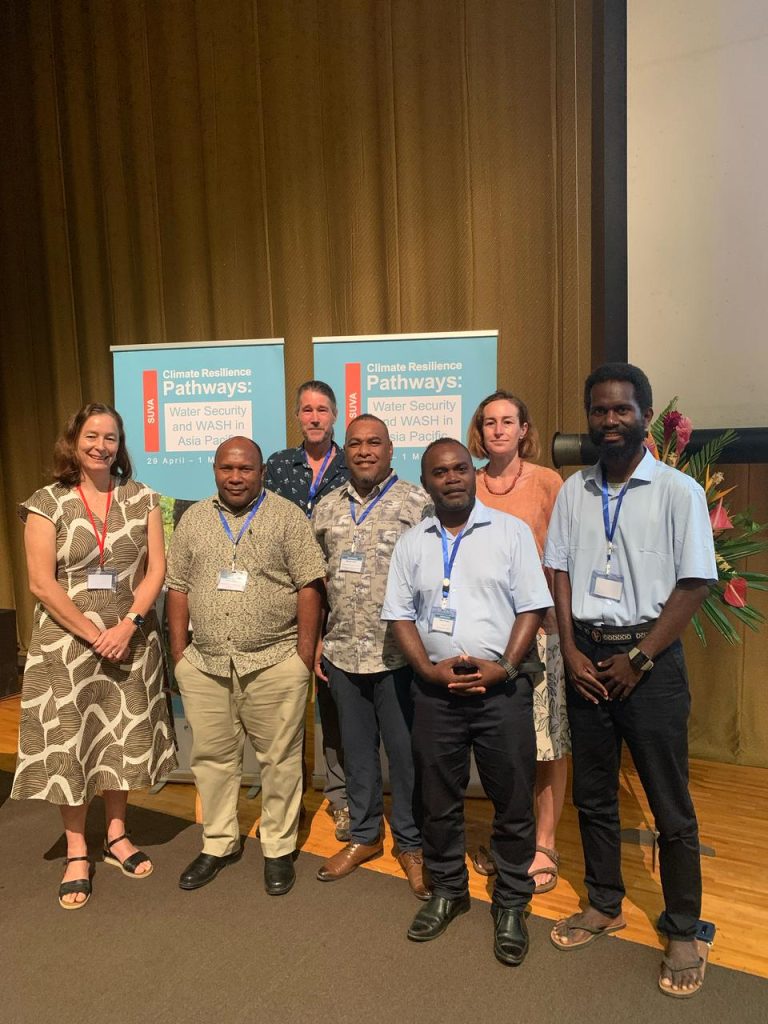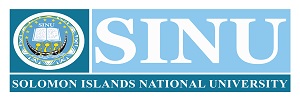𝐏𝐫𝐞𝐬𝐬 𝐑𝐞𝐥𝐞𝐚𝐬𝐞

Photo Caption: SINU and IWC/Griffith University research team with Solomon Islands government officials at the Water Security and WASH in Asia-Pacific Conference 2025. Front row (L–R): Dr. Regina Souter, Richard Molea, Nixon Panda, Collin Benjamin. Back row (L–R): Dr. Mark Love, Malachi, Rosie Sanderson.
On Tuesday, 29th of April, two staff members from the Solomon Islands National University (SINU), Nixon Panda (Associate Dean Research – Health Sciences and Head of School of Public Health) and Collin Benjamin (Tutor/Researcher, School of Public Health), presented at the “Climate Resilience Pathways: Water Security and WASH in Asia Pacific” conference, held concurrently in Suva and Bangkok.
The event, attended by over 160 participants in Suva, Fiji brought together Pacific Islanders and stakeholders working in the Water, Sanitation, and Hygiene (WASH) sector. It marked the final major gathering under the Australian Government’s flagship seven-year Water for Women Fund.
Since 2018, SINU has been a key partner in this program through its collaboration with Griffith University’s International Water Centre (IWC), contributing to Pacific Community Water Management Plus (the PacWaM+) research initiative.
In the first session, Nixon and Collin co-presented with Tom Rankin (Plan International) on “Localising Water Safety Planning: Practices for Climate-Resilient Water Security in the Pacific Islands”, which reported on the results of Community Water Security Improvement Planning undertaken by Plan and Live and Learn Environmental Education, in collaboration with SINU and IWC. Other participants in the 90-minute session included a representative from the Ministry of Health and Medical Services (Fiji) and Vanuatu’s Department of Water.
At the second session, Nixon and Collin presented the results of the latest iteration of the PaCWaM+ research program, which focused on decentralisation and rural water management. They were joined by Mr. Erie Sami from the Department of Water, Vanuatu; Dr. Sarah Pene from the University of the South Pacific (Fiji); and Suliasi Batikawai from the International Water Centre (IWC). The session was convened by Associate Professor Regina Souter and Dr. Mark Love of the IWC.
On Thursday, Collin Benjamin co-facilitated the final plenary session—his first experience facilitating at such a high-level international event. This marked a significant milestone in his emerging role in global dialogues on water and development.
Also attending was Rosie Sanderson, an adjunct at SINU and researcher with the IWC, who contributed to a session on “Sanitation in challenging urban environments.” In addition, Mr. Richard Mole (Director, Water Resource Management Division, Ministry of Mines, Energy and Rural Electrification) and Mr. Malachi Batee (Chief Climate Resilience Officer, Ministry of Environment, Climate Change, Disaster Management and Meteorology) participated in the conference with support from UNICEF.
The research on decentralisation, which was undertaken in not only Solomon Islands but also Fiji and Vanuatu, explored the strengths, challenges, and opportunities associated with decentralising water service delivery.Following the replacement of RWSS with RWASH in 2014, both the National RWASH Policy (2014) and RWASH Strategic Plan (2015-20) advocated the devolution of greater responsibility for health programming, including EHD/RWASH, to the provincial level, with RWASH earmarked to steadily move away from implementation towards a regulatory and monitoring role as more “service delivery partners” – private sector and non-government organisations (NGOs) – took over implementation. This has not materialised as envisioned in the Policy.
Subnational governance has long been a topic of intense debate in Solomon Islands and the wider regions, with Solomon Islands having the weakest decentralisation of the three countries, especially since Area Councils were dissolved in the late 1990s, after which rural service delivery and development faltered. Key findings include:
• Solomon Islands has one of the lowest per capita WASH expenditures in the Pacific (USD$1:30 per person)
• Limited financial information and slow procurement processes contribute to recurrent underspends (15 – 51% execution rate 2015–20) and hinder effective decentralisation
• Inactive oversight committees and non-functional stakeholder groups delimit effective sector coordination
• Significant staffing challenges hinder the progress of both decentralisation and rural water delivery
• Significant staffing challenges hinder the progress of both decentralisation and rural water delivery
However, there is some progress: Ward Development Committees (WDCs) signal a shift towards greater decentralisation and hold the promise of correcting the socio-political and developmental vacuum that has existed at the rural level since the abolition of Area Councils.
The participatory planning through WDCs is a positive development and although they currently do not they could – and the presenters argued that they should – support rural community water management outcomes, especially as research both here in the Pacific and elsewhere in the world clearly demonstrates that Water/WASH Committees need ongoing monitoring and support to remain active and efficient. Other positives include the development of Provincial WASH plans in some provinces (e.g. Western).
Nixon Panda stated, “to achieve SDG 6, it is imperative to prioritize WASH in the rural areas of the Solomon Islands, where approximately 74% of the population resides. This necessitates urgent political commitment, the development of climate-resilient systems, and equitable solutions to address the disproportionate impacts on women and children. Water security must be recognised as a fundamental right, transcending mere infrastructure. Collaborative efforts are essential to advance the WASH agenda. The time for action is now.”
Collin highlighted the benefits of attending the conference stating,“It was an amazing conference for me. I was challenged and motivated at the same time, listening to the perspectives on water security and WASH shared from researchers, consultants, policymakers, funders, and implementers within the Asia Pacific region. My favorite quote from the conference. Came from Mr. Exsley Taloiburi (a fellow Solomon Islander) from the Green Climate Fund, who stated that ‘Our Role as Academics and Researchers is critical to collect and provide credible data to inform viable project proposals for implementing tangible developments in the water sector.”
With access to basic drinking water declining from 76.47% in 2000 to 59.41% in 2022, something has to be done. However, the researchers warned that underfunded decentralisation can lead to even worse water service delivery outcomes – as has happened in some African countries – and also emphasised that decentralisation takes decades, not years, to unfold.
END//
